Isn't media great? Thankfully it's moved on from the 90s buzz-word of "multimedia". Everything from pictures, music, books, films all the way through to my old undergraduate lecture notes. This is the stuff that can provoke a wide range of emotional responses from nostalgia all the way through to relaxation. In the days of the 20th century all this media came in different forms: photographs, cassettes/CDs, vhs/DVD. In the early days on the 21st century people began converting to digital cameras which freed them from the shackles of being careful what shots to make to conserve film and having to print out (and then store) all their pictures. In the middle of the noughties people began to embrace digital music in the place of physical CDs to the point where the top40 was nearly abolished and many shops stopped selling all but the most popular singles. As we move towards the next decade, there is increased interest in video downloads and ebooks - in fact ebook readers are starting to be rammed down our throats this Christmas, but I can save that for another post. One outcome of this switch from the bulky analogue "physical" formats to the digital domain combined with the increases in codec performance and hard drive size is that people can now store all their media on their computer: full CD collections, a lifetimes photographs, home videos and DVDs. My parents have just bought a document scanner so I now have all my undergraduate notes in pdf format that I can take with me anywhere without needed to lug around the original folders of notes. I've also been able to jettison years of bank and credit card statements too.
I've written about this before in my piece on minimalist lifestyles. In the last few years I set about converting all my precious media into digital form. The majority of my DVDs are now in m4v format and all of my music has been ripped to mp3 (although I have just re-ripped it all to a lossless format for archival purposes). What I haven't really touched on (or thought about until this year) is data security. I was exposed to this in 2001 when my parents PC was stolen during a break-in. All my files (school projects, essays and reviews and emails) were lost. But I was actually quite lucky as that was at the beginning of the digital revolution and I didn't loose too much. I have noticed thought that people don't really think about keeping their media safe, as previously - short of their house burning down - it was fairly safe in physical formats. It's highly unlikely any burglars would be interested in you photo albums but they are interested in the computers that people have entrusted their whole media collections onto. With this goes all the emotional connections their media can trigger. If the computer breaks, is stolen or lost or corrupts all these things are put at risk. It used to be that we were lucky to be able to fit all our music on our computer at ridiculously low bitrates, and now we can fit all our 256 Kbps tracks onto our iPods. There's definitely something very liberating about having your whole music, film, book and photo collection contained on something smaller than a hardback book, but at the same time something that valuable must be fearsomely protected too.
A lot of people will say that hard drives are too expensive, but I would argue that spending a bit of money is a lot better than facing the loss of a media-filled drive. Photos of family, friends and holidays, large collections of emails, music collections and a whole heap of other personal files. I will advise some ways to properly protect your files.
The most obvious way is to simply buy a large external hard drive and copy all your files to it. The trouble with this approach is maintaining this backup as you add and update more media files. Solutions such as Time Machine for Mac offer a good way of keeping an incremental backup (so older versions of files are preserved as well as new ones) or SyncToy for windows (for simple synchronisation of drives) are free solutions. Simply doing this will put you ahead of 90% of people who have no backup at all - a 1 TB USB drive costs about £60-65 at the moment. If you share media between several computers, a NAS (i.e. a hard drive that plugs into your network router) is a good option as anyone on your network can access the files. More expensive models offer two or more drives and offer so-called data redundancy. The idea is that with two (or more) drives, if one drive dies, the data is still on the other one (obviously your storage is equal to the size of the smallest drive) and with three or more drives, the data is spread across them in such a way that any drive failing won't result in a loss of files.
A lot of people rely on these multidisk NAS solutions but it isn't foolproof. If more than one drives dies, or the unit itself dies, or you are robbed or your house burns down you're equally stuffed. Unless you genuinely need more than a couple of terabytes of storage I'd simply recommend a simple NAS such as this one and then also buy a USB drive which you can use to back up the NAS automatically at set periods and then store at another location such as work. To be really thorough, buy 2 USB drives, keep one at home to back up the NAS and one at work changing them over every week or so. This may seem over the top, but for under £250 you can have a secure 1 TB setup (a 1 TB NAS and 2 1 TB USB drives).
The other alternative that probably isn't feasible at the moment for bulk media backups is cloud storage. More and more firms are offering storage space that can be accessed through the internet and backed up using commercial systems. Of course, the downsides to this are a monthly fee for sizeable amounts of storage and the insanely low upload speed most people in the UK see (our "fast" connection offers us 1 Mbps upload compared to 14 Mbps download). For small files (such as documents) I can recommend Dropbox which offers 2 GB of cloud storage for free. Your files can be accessed from any device running dropbox (PCs, Macs, linux, phones).
Sunday, December 06, 2009
India Part 3
On our final day in Agra, we took a trip out to Fatehpur Sikri about 30 miles away that is a town founded by a Moghal Emperor and then mysteriously abandoned 15 years later. As our booked taxi driver dropped us off at the foot of the hill, a Rickshaw took us up to the gates of the city. Again we were "compelled" to take a guide with us, and we explored the first few areas of the city. The weather was beautiful and cool and the city serene. That is, until we approached the final section of the city set next to the main road. The area was sprawling with hawkers who followed us round all the way up to the entrance trying to sell us tat. Things didn't improve that much on the inside as a whole different set of hawkers attacked us. As we approached Tomb of Salim Chishti, where you can attach a thread to make a wish we were informed that to make a wish you had to buy a cloth from the hawker (an official person our guide informed us). After picking a purple silk-style handkerchief we were informed that this particular "cloth" would cost us over Rs: 1200 (about £30). Unsurprisingly we passed on this "offer" and even though we were told this was a "very reasonable price" we moved on. Most upsetting for my mother who had come back to untie her thread as her wish (to return to Fatehpur Sikri).

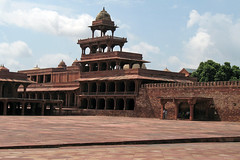
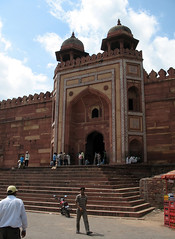


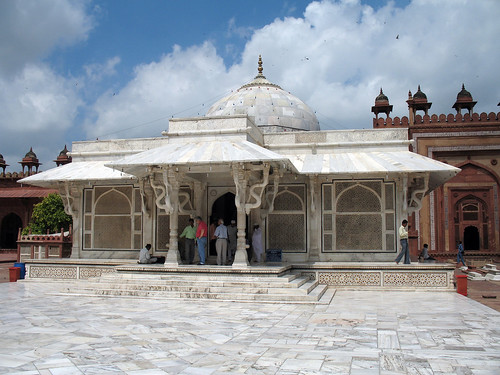
Anyway, with our tour complete we headed back out and down the hill to await our taxi back to Agra. We bundled into the taxi with a different driver and headed back. After about 20 minutes our driver pulled off the main road and into a small restaurant, where he announced that due to union rules he had to have a half hour break. What this essentially meant was that the restaurant we had stopped at was paying our driver a kickback to bring tourists to them. Unfortunately for our driver, who disappeared into a back room, the four of us sat down for half an hour and had one bottle of Pepsi between us. After half an hour (presumably during which time our driver was getting a bollocking for bringing tight-wads to the restaurant) we set off again. Driving past the small shanty towns the amazing thing was the amount of advertising. Nearly every settlement had adverts for Pepsi or Colgate on the sides of the shacks, not papered up like we're familiar with, but painted on. The odds of such products being available in these shanty towns was slim to none. When we got back to the air-conditioned luxury, Emma and I decided to take to the streets and explore Agra by foot. When we reached the hotel gate we were faced with a 50:50 left-right choice. We made the wrong choice. After about a quarter of a mile, the only things we had found were a dead, bloated dog in the drain and a very annoying cycle-rickshaw driver who followed us for about a mile and a half as we doubled back on ourselves and headed the other way. He seemed quite insistent that there was no point walking and that we should pay him to drive us. Eventually we lost him down a narrow side street. The city is basically a sprawl around its cultural sites and there really isn't much else on view bar open sewers and poverty. We caught site of monkeys leaping from roof to roof and views into random bric-a-brac stores and homes. One friendly local approached us for a chat to practise his English, but were relieved to get back to the hotel: as the Wikitravel guide notes: "After getting off the streets of Agra and into your hotel, you won't want to go back anyway."
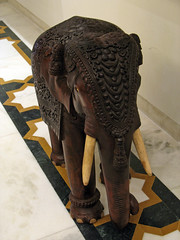
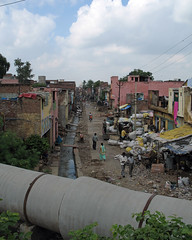

We head back to the station and got the train back to Delhi, which was livened up by some kind of creepy crawly crawling round the carriage. The following day, we headed out for lunch with more relatives I hadn't seen in years - this time a former Indian Ambassador. After lunch we raced back to the airport only to find our flight had been cancelled and we'd been shunted to the next flight.
The final week in Bombay consisted of seeing more relatives - some of whom looked very old and some of whom hardly seemed to have changed at all, eating a lot of good food and me getting a tailored suit made and, of course, swimming. Towards the end of the week Emma and I headed into town early to get the boat from the Gateway to Elephanta island - something else we used to do every year. The slow boat chugged out to the island for about an hour and then we walked up the long stairs to the caves where ancient stone carvings of the ancient gods Brahma (the creator), Vishnu (the preserver) and Shiva (the destroyer) which date back to the 9th century and have mostly survived despite the Portuguese using them as target practice in the 17th century. This time after fighting our way through the guides on the way up, we were met by an official guide inside (with a price of Rs 0).
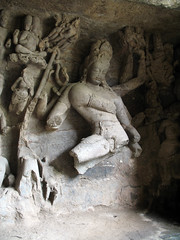

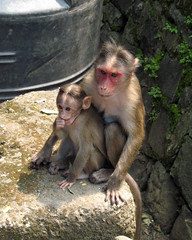
After watching the local monkeys playing for a bit we caught the boat back to the mainland and had lunch at a local Chinese restaurant and an abortive visit the the famous (and now infamous) Taj Mahal hotel.



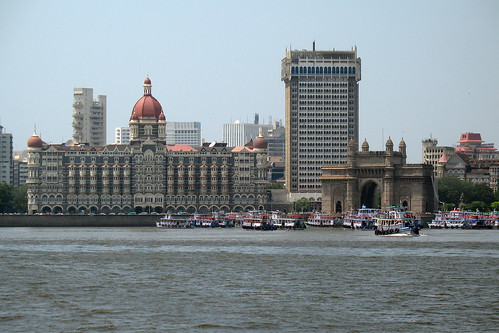
By the end of the week it was finally time for the dinner at the Racecourse to celebrate my Aunt's 70th birthday attended by several of my Aunt and Uncle's friends from the Willingdon club. With such an exclusive history and an even longer waiting list for membership, the club certainly hosts the elite of Mumbai. Finally it was time to head home. The chaos at the airport seemed to be worse than I remember. The airport still operates a policy of only passengers being allowed in the building so the drop-off area is overrun with relatives and queues to get in. This was going to be interesting since we didn't have a ticket (just our e-ticket number). Thankfully, the guard seemed to realise that the big suitcases we had signalled that we were going to be catching a flight and let us in. The terminal is still being "upgraded" and the place was simply a mess. An overrun mess. As in Schiphol on the way out, we all had to be interviewed by US security as we were flying a US airline and then finally, just before midnight we were off.
And that was it. But not quite. I woke up somewhere near Eastern Germany. With only about 90 minutes I assumed we had missed breakfast, but then something didn't seem right as the lights were still down. As we passed central Germany the lights suddenly came on and the flight attendants began serving breakfast. Luckily we were near the front of the queue, but before even half our cabin had even been served, the captain came over the intercom announcing we were beginning our decent into Amsterdam. As we slowed and descended over northern Holland, the stewardesses began saying "Someone should call him!" to each other. Eventually, everybody had been served, but then the captain came back over the intercom to tell the flight crew to take their seats. For a second it looked like we'd be making a landing with our breakfast. Even at the point the cabin crew seemed to think they'd be okay until the wheels came down and one remarked "We're not going to make it!" No kidding. Suddenly the engines roared as full climb throttle was applied and we overshot the runway in a missed approach after someone had presumably told the captain that the economy cabins were still tucking in to breakfast. After circling to allow the consumption, we finally landed at Schiphol. The crew didn't say a word as we filed off. When we arrived back into Birmingham the same weird sound and feeling that I remember from my previous visits came back. The sound was order: no horns blaring, no cars driving inches from where we walked, disciplined (sort of) driving and the feeling was cold. It's almost as much of a system shock returning to the UK after a fortnight in India as it is getting there in the first place!






Anyway, with our tour complete we headed back out and down the hill to await our taxi back to Agra. We bundled into the taxi with a different driver and headed back. After about 20 minutes our driver pulled off the main road and into a small restaurant, where he announced that due to union rules he had to have a half hour break. What this essentially meant was that the restaurant we had stopped at was paying our driver a kickback to bring tourists to them. Unfortunately for our driver, who disappeared into a back room, the four of us sat down for half an hour and had one bottle of Pepsi between us. After half an hour (presumably during which time our driver was getting a bollocking for bringing tight-wads to the restaurant) we set off again. Driving past the small shanty towns the amazing thing was the amount of advertising. Nearly every settlement had adverts for Pepsi or Colgate on the sides of the shacks, not papered up like we're familiar with, but painted on. The odds of such products being available in these shanty towns was slim to none. When we got back to the air-conditioned luxury, Emma and I decided to take to the streets and explore Agra by foot. When we reached the hotel gate we were faced with a 50:50 left-right choice. We made the wrong choice. After about a quarter of a mile, the only things we had found were a dead, bloated dog in the drain and a very annoying cycle-rickshaw driver who followed us for about a mile and a half as we doubled back on ourselves and headed the other way. He seemed quite insistent that there was no point walking and that we should pay him to drive us. Eventually we lost him down a narrow side street. The city is basically a sprawl around its cultural sites and there really isn't much else on view bar open sewers and poverty. We caught site of monkeys leaping from roof to roof and views into random bric-a-brac stores and homes. One friendly local approached us for a chat to practise his English, but were relieved to get back to the hotel: as the Wikitravel guide notes: "After getting off the streets of Agra and into your hotel, you won't want to go back anyway."



We head back to the station and got the train back to Delhi, which was livened up by some kind of creepy crawly crawling round the carriage. The following day, we headed out for lunch with more relatives I hadn't seen in years - this time a former Indian Ambassador. After lunch we raced back to the airport only to find our flight had been cancelled and we'd been shunted to the next flight.
The final week in Bombay consisted of seeing more relatives - some of whom looked very old and some of whom hardly seemed to have changed at all, eating a lot of good food and me getting a tailored suit made and, of course, swimming. Towards the end of the week Emma and I headed into town early to get the boat from the Gateway to Elephanta island - something else we used to do every year. The slow boat chugged out to the island for about an hour and then we walked up the long stairs to the caves where ancient stone carvings of the ancient gods Brahma (the creator), Vishnu (the preserver) and Shiva (the destroyer) which date back to the 9th century and have mostly survived despite the Portuguese using them as target practice in the 17th century. This time after fighting our way through the guides on the way up, we were met by an official guide inside (with a price of Rs 0).



After watching the local monkeys playing for a bit we caught the boat back to the mainland and had lunch at a local Chinese restaurant and an abortive visit the the famous (and now infamous) Taj Mahal hotel.




By the end of the week it was finally time for the dinner at the Racecourse to celebrate my Aunt's 70th birthday attended by several of my Aunt and Uncle's friends from the Willingdon club. With such an exclusive history and an even longer waiting list for membership, the club certainly hosts the elite of Mumbai. Finally it was time to head home. The chaos at the airport seemed to be worse than I remember. The airport still operates a policy of only passengers being allowed in the building so the drop-off area is overrun with relatives and queues to get in. This was going to be interesting since we didn't have a ticket (just our e-ticket number). Thankfully, the guard seemed to realise that the big suitcases we had signalled that we were going to be catching a flight and let us in. The terminal is still being "upgraded" and the place was simply a mess. An overrun mess. As in Schiphol on the way out, we all had to be interviewed by US security as we were flying a US airline and then finally, just before midnight we were off.
And that was it. But not quite. I woke up somewhere near Eastern Germany. With only about 90 minutes I assumed we had missed breakfast, but then something didn't seem right as the lights were still down. As we passed central Germany the lights suddenly came on and the flight attendants began serving breakfast. Luckily we were near the front of the queue, but before even half our cabin had even been served, the captain came over the intercom announcing we were beginning our decent into Amsterdam. As we slowed and descended over northern Holland, the stewardesses began saying "Someone should call him!" to each other. Eventually, everybody had been served, but then the captain came back over the intercom to tell the flight crew to take their seats. For a second it looked like we'd be making a landing with our breakfast. Even at the point the cabin crew seemed to think they'd be okay until the wheels came down and one remarked "We're not going to make it!" No kidding. Suddenly the engines roared as full climb throttle was applied and we overshot the runway in a missed approach after someone had presumably told the captain that the economy cabins were still tucking in to breakfast. After circling to allow the consumption, we finally landed at Schiphol. The crew didn't say a word as we filed off. When we arrived back into Birmingham the same weird sound and feeling that I remember from my previous visits came back. The sound was order: no horns blaring, no cars driving inches from where we walked, disciplined (sort of) driving and the feeling was cold. It's almost as much of a system shock returning to the UK after a fortnight in India as it is getting there in the first place!
Subscribe to:
Comments (Atom)
